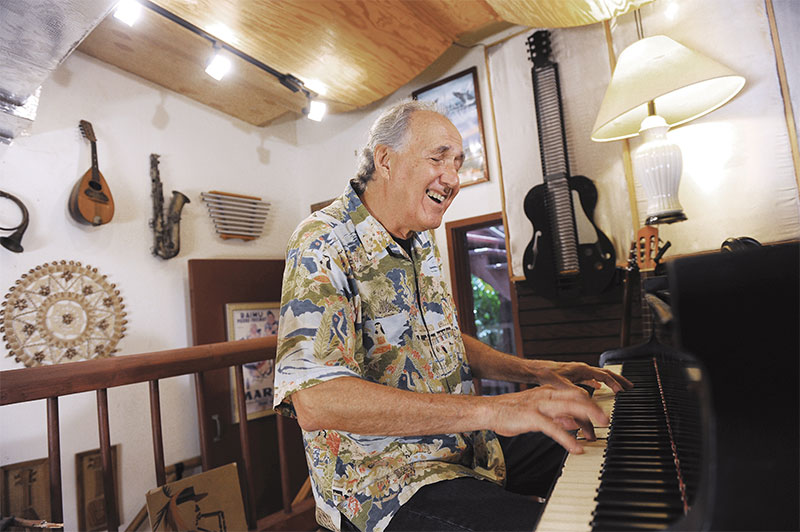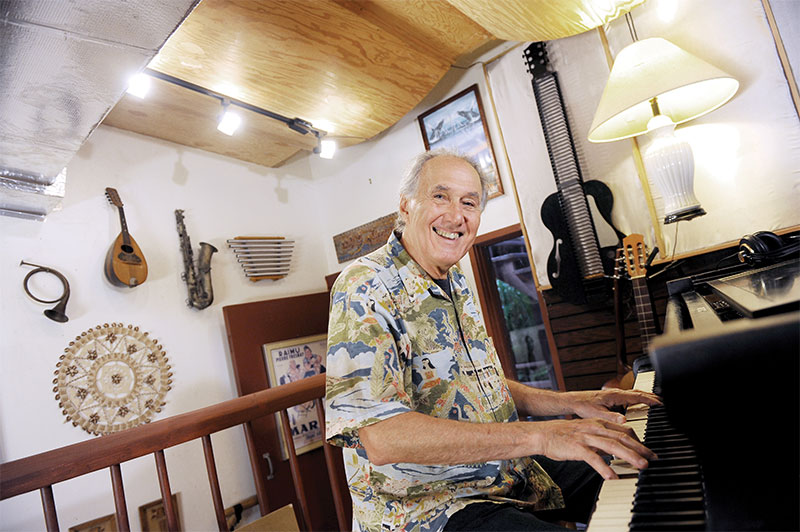All About the Sound
It’s always music forward for Pierre Grill, who remains one of Hawai‘i’s best sound engineers and producers after 40 years.
Tucked away in the arboreal landscape of Mānoa Valley is a fertile atelier that’s billed as the longest-running music studio in the islands.
Rendez-Vous Recording is rooted near the end of Beaumont Woods Place, a winding road that leads visitors ever upward along Wa‘ahila Ridge. Those who enter its doors are treated to a c’est magnifique experience and feast of the senses, courtesy of an owner with an adorably thick French accent who showers guests with avocado for their taste buds, eclectic artwork for their eyes and a musical smorgasbord for their ears.

Pierre Grill entertains diners every Wednesday at The Signature Prime Steak & Seafood restaurant in Ala Moana Hotel. Here, he tickles the ivories on a grand piano from his studio’s loft in Mānoa.
For more than four decades, Pierre Grill has been all about the sound, serving as producer and engineer extraordinaire for a number of Hawai‘i’s finest musicians as well as its lesser-known talent. In making magic within the confines of a spacious studio that features vaulted ceilings and bamboo accents, Grill puts recording artists at their creative best through an assortment of inspirational wall-hanging masks, tapa coverings, old concert fliers, and giclée and original paintings. The latter are positioned throughout his workplace and range from a reggae-colored print with the encouraging words “Music Forward!” on it to a dissonant depiction of an individual (a gift from his brother) that Grill titled Schizophrenia and once used it for an album cover.
More appreciably, Grill offers his clientele the latest in recording software and equipment, as well as access to a bevy of his choicest instruments. Among his collection are Toca congas to bang on, Fender Telecaster and Michael Kelly electric guitars to riff on, Kamaka and Kala ‘ukulele to strum on, and a vintage Hammond B3 organ and 7-foot Bald-win grand piano — which rests comfortably in a loft overlooking the studio — to plink on.

Pierre Grill entertains diners every Wednesday at The Signature Prime Steak & Seafood restaurant in Ala Moana Hotel. Here, he tickles the ivories on a grand piano from his studio’s loft in Mānoa.
“My setup is by now the best ever, combining very classic instruments and vintage gear with the latest software,” explains Grill, who initially opened his recording business on Kona Street in Honolulu before relocating to Mānoa in the early 2000s.
“All that was not even a dream 40 years ago.”
A lifetime spent accumulating just about every electronic device and musical part imaginable has compelled him to squirrel them away in drawers and around every corner. Even microphone stands have become ubiquitous in his studio.
“All my life I never had enough mic stands,” laments Grill, pausing to scan the number of freestanding mounts in front of him before letting out a heavy sigh. “I feel like an idiot. I now have more than I need — too much.”
Not that any recording artist has ever complained about the surplus of equipment at Rendez-Vous. If anything, the abundance is just one of the reasons why musicians from near and far have flocked to his studio over the decades. In recent months, they have included ‘ukulele ace Taimane, who just released her latest CD, Hawaiki, on which Grill served as assistant producer and engineer; Sun Hui, a Taiwanese-born erhu player and Nā Hōkū Hanohano Award winner; slack-key guitarist Stephen Inglis; singer-songwriter Maka Esteban, who Grill calls “an amazing karaoke winner in Las Vegas”; and New Age singer and “sound healer” Ayumi Ueda.
“That’s quite a variety of talents,” notes the experienced producer who’s also a past recipient of Nā Hōkū Hanohano honors in sound engineering.
For Grill, each decade has had its trend of musical forms that have caught his ear and inspired him to jump into. In the early to mid-’80s, he chose to record local metal groups such as Sacred Rite and Marty Friedman (a guitarist with the bands Hawai‘i and Megadeth); later, he welcomed bookings with Christian and country musicians. By the following decade, however, he found himself gravitating toward Jawaiian music following its explosion in the islands.
“It was my busiest era with (acts) like Willie K, Kapena, Danny Couch, Del Beazley, Ka‘au Crater Boys and more,” Grill recalls. “My studio at one time was booked one month in advance.”
The 2000s featured recording sessions with a new batch of various local talent — Makana, Kristian Lei, Ginai and Streetlight Cadence among the notables. Even famous opera types such as baritone Quinn Kelsey came calling for his services. Since then, Grill has continued to offer his experienced ears and deft touch to anyone willing to be guided by his sometimes laissez-faire approach to recording music, which includes not correcting every little supposed gaffe.
“You bring in a sh—y sound, badly played and stuff, and if it makes your song go up, leave it alone — it sounds fine,” explains the self-described lover of free jazz and atonal music. “If you fix it, you will (screw) it up.
“I’m not worried about mistakes,” he adds. “Music is supposed to be fun.”
Of course, Grill didn’t always feel that way about mistakes. Soon after meeting Willie K in 1990 and beginning work on the musician’s seminal album Kahaiali‘i, he recalls questioning the singer’s pitch during one early recording session.
“Willie comes from the old school, Motown, where the backup is slightly flat,” Grill says. “So, we’re recording and I tell him, ‘I think you’re a little bit flat.’ He then looks at me and sings a few parts all in tune — and he sounds like sh–! So he asks me, ‘Is that what you want?’”
It was an extraordinary moment for Grill, who came to realize that sour notes aren’t necessarily bad.
“In some situations, the flat note sounds just right,” Grill further explains. “The flat pitch changes the feel, but it doesn’t mean it’s wrong. There’s nothing wrong in art. It’s what works and what doesn’t.
“With Willie, his backup singing was phenomenal … he was way beyond most people.
“That whole album, we arranged everything together, all his hit songs,” continues Grill while remembering those days of recording with his gifted friend, who died in 2020. “I never worked with anyone close (in musical ability) to Willie. To me, he is our best talent ever, and it was a joy to work with him.”
That includes those delightful and humorous moments outside of the studio while they entertained live audiences together.
“I’ve been on the stage with him at the piano and I remember the first time we played together and somebody called out, ‘Ho, who da haole guy ova dea?!’” recalls Grill with a soft chuckle. “Willie looks over at the guy and says, ‘He ain’t haole — he’s French!’”
Perhaps unsurprisingly, Grill is quite the musician himself. For the past 10 years, he’s been a constant at The Signature restaurant in Ala Moana Hotel, where he tickles the ivories every Wednesday evening for diners. He’s also a gifted one-man band whose performances — in which he simultaneously plays a trumpet or trombone with his right hand and piano with his left, all while controlling bass pedals with his feet — can be viewed on YouTube.
And wherever and whenever there’s an opportunity, he gladly performs with his band, Pierre and the Oompahs. Their next show is slated for this weekend (6-9:30 p.m. on Saturday, Oct. 22) during the Oktoberfest fundraiser at Mary, Star of the Sea School in Kāhala. The event will showcase the quartet playing traditional German and polka music, and leading the ever-popular chicken dance.
“I’ve always worked at making music (and) my one-man band act is pretty much unique,” explains Grill, who’s produced his share of original compositions as well as released his own albums, including his latest, Jazz Vignettes. “I also ventured into classical composition with a 6-minute-long ballet piece, putting me in the shoes of the classic composers — (but) without their talent and with no formal training!”
For as much time as he spends in his studio, Grill also passes many hours laboring just outside of its confines. Located behind Rendez-Vous is his latest and possibly greatest composition: a garden full of avocado trees.
“This is the best part of the property,” he says, stepping onto a deck that overlooks the many trees below and beaming with pride at their growth. “This is how you know you’re not in New York City.”
Grill says he got into gardening some time ago, in part because he wanted to “provide fruits for the neighbors.” But there was another reason why the recently turned septuagenarian decided to embrace the farm life.
“Since it is Mānoa, everything here is a full aerobic exercise that I enjoy very much,” he shares, moving his long, branch-like arms back and forth as if he’s getting ready for another gardening workout. “This is my exercise, my gym.”
In considering his lengthy career in the music business, Grill admits that part of his success can be attributed to his resourcefulness.
“What kept me in business is I know a few things about a lot of things,” says the man who was born in a small French village within St. Laurent De Cerdans, located in the Eastern Pyrénées, and moved to the islands on Thanksgiving Day 1978. “I fix my computer, I fix my tube amp. One of the reasons I stayed in business all that time was I don’t give up.
“If something breaks today, tomorrow I’m back in business.”
Ever resilient, Grill has continued to roll with the punches as the music industry has morphed over the years.
“The business in its original form almost totally disappeared — imploded — and is gradually rebuilding in a completely different form,” he explains. “The young crowd is enjoying it, but it is even more difficult than ever to make any money.”
Despite the evolving musical landscape and the challenges that come with it, Grill doesn’t believe he’s anywhere close to cutting his last tracks. If anything, the last few years have been “perfect timing for me,” and allowed him to be more selective about who and what he records.
“I am working on my semi-retirement anyway and that allows me to pick my clientele and jobs,” he admits. “So, I’m doing just fine.”







